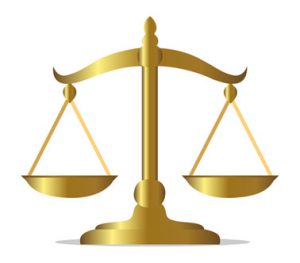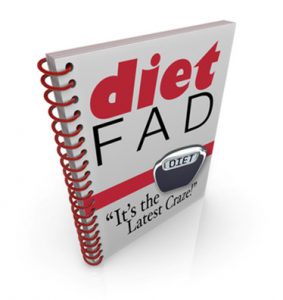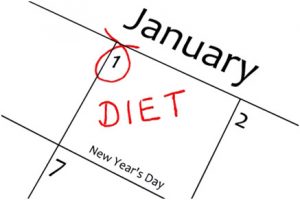Calories Rule
Author: Dr. Stephen Chaney
Next week you’ll be making your annual New Year’s resolution that this will be the year that you finally lose those extra pounds and keep them off!
The good news is that you will have lots of choices for losing that weight. The bad news is that most of those choices are bogus!
You see each diet book and Internet marketer will have a “magic formula.”
- Sometimes it will be a “magic” diet composition – low fat diets, low carb diets, high protein diets – or don’t eat protein and carbohydrates together.
- Sometimes it will be a “magic” food – grapefruit, cabbage soup, acai berries or chocolate.
- Sometimes it will be a villainous food or food group to avoid – sugar, grains, or dairy.
All these diets are hyped with a lot of scientific sounding mumbo jumbo and many of them have short term studies that seem to show that they work. But whenever well designed scientific studies have been performed that compare these diets at equal calorie levels and look at weight loss over two years or more, there is not a dime’s worth of difference between them.
With Weight Loss Diets, Calories Rule
 Despite all the hype that you will hear, weight loss is dependent on the difference between calories in and calories out.
Despite all the hype that you will hear, weight loss is dependent on the difference between calories in and calories out.
Don’t misunderstand me, I recognize that the calorie equation is not identical for everyone. For example, in a recent issue, “Does Genetics Determine Weight,” of “Health Tips From The Professor” I talked about a study that put all of the subjects in a metabolic ward where every aspect of calorie intake and calorie expenditure were controlled. They then restricted calories by the same percent for everyone for 6 weeks. The subjects with “thrifty genes” lost 5% of their body weight. Subjects with “spendthrift genes” lost 12% of their body weight.
- The good news is that everyone lost weight. Calories rule!
- The bad news is that some people lost weight more slowly than others. Life isn’t fair.
The problem, of course, is that we don’t live in a metabolic ward. We have trouble keeping track of the calories we eat and overestimate the calories we burn. That’s why fad diets are so popular. They promise you won’t have to track calories. You don’t have to watch what you eat. You won’t need to exercise. All you need to do is eat the foods they tell you are OK and avoid the foods they tell you are bad. This is not how to choose a weight loss diet.
I have a news bulletin: There is no “magic diet formula,” no “magic diet composition” and no “magic diet food.” Did you really think that someone had repealed the laws of thermodynamics?
Once you understand and accept that the difference between calories in and calories out is the most important determinant of successful weight loss, you can start to understand the key principles of successful weight loss.
Choosing The Best Weight Loss Diet
 Here is a quick guide to choosing the best diet:
Here is a quick guide to choosing the best diet:
Principle #1: The diet doesn’t have to be weird to be successful.
In fact, the diet is most likely to succeed if it includes foods that are familiar to you.
If you’re a “meat and potatoes” guy, a vegetarian diet is not likely to be successful for you (Some of my friends refer to that kind of diet as “rabbit food”). If you are a vegetarian, a meat-based low-carb diet is not likely to be appealing.
More importantly, we are all different. Some of us will lose weight successfully on one diet. Other people will be more successful on a different diet. That means that the diet that worked so well for your friend might not work at all for you. You will need to experiment a bit to find the best diet for you.
And, before you ask me, your body type or blood type has absolutely nothing to do with which diet is going to work best for you.
Of course, you will need to make some changes to your diet. You will want to drop unhealthy foods from your diet and include some foods that are new to you. The first foods to go should be sodas (both sugar-sweetened and diet), junk foods, and fast foods. In their place add water or herbal tea, fruits, vegetables, and whole grains. That change alone can be worth at least 2-5 pounds in your first month.
You will want to think about what you are eating and make conscious choices about which foods are helping you fulfill your goals of losing weight and which are not.
Principle #2: The diet should be one that is healthy in the long run.
I’m particularly talking about the popular high fat, low carbohydrate diets here. It is clear diets high in meat and fat – particularly saturated and trans fats – are associated with increased risk of heart disease, diabetes, cancer and inflammatory diseases.
Plus, high fat diets just don’t work well for long term weight control. Fat has more calories than carbohydrate. This is not rocket science!
Just in case you don’t believe me, you just need to consult the National Weight Control Registry. The National Weight Control Registry was established in 1994 and has tracked the weight loss strategies of over 5000 people who have been successful at keeping their weight off long term.
While those people lost weight using every diet in the books, the vast majority of them who were successful at keeping their weight off long term followed a low calorie, low-fat diet to maintain their weight loss. Of course, I am not referring to a low-fat that contains a lot of sugar and refined carbohydrates. That kind of diet is part of the problem. I am referring to a plant-based low-fat diet with lots of fruits, vegetables, legumes and whole grains.
Principle #3. Don’t forget the other part of the calorie equation. That’s right, I’m talking about exercise.
While you burn some calories every time you exercise, the real value of exercise is that it increases lean muscle mass – and lean muscle mass burns more calories than fat.
Again, if you consult the National Weight Control Registry, you will find that virtually everyone who has been successful at keeping the weight off exercises on an almost daily basis.
Helpful hint: The handy exercise monitors on your Fit Bit, smart phone, and exercise machines overestimate energy expenditure by as much as 50%. Decrease those numbers accordingly when you are estimating your calorie balance for the day.
Principle #4: Don’t start if you don’t intend to finish. Once again, the National Weight Control Registry puts that in perfect perspective.
Almost everyone who was successful at keeping the weight off long term had stopped thinking of it as a diet. It had become a way of life. It was how they ate. It was the exercise that they liked to do on a daily basis. It no longer required any conscious effort. It no longer required any will power.
This is perhaps the most important weight control principle of all:
When you make your resolutions this New Year, don’t make a resolution to change your weight. Make a resolution to change your life.
The Bottom Line
Forget the hype. There is no “magic diet formula”, no “magic diet composition” and no “magic diet food.” While the calorie equation is different for each of us (see article above for details), weight loss always requires that calories out be greater than calories in. Calories rule!
Here are four simple principles to keep in mind when selecting the best diet to lose weight next year.
#1: The diet doesn’t have to be weird to be successful.
#2: The diet should be one that is healthy in the long run.
#3: Don’t forget the other part of the calorie equation, i.e. exercise.
#4: Don’t start if you don’t intend to finish.
For more details, read the article above.
These statements have not been evaluated by the Food and Drug Administration. This information is not intended to diagnose, treat, cure or prevent any disease.

